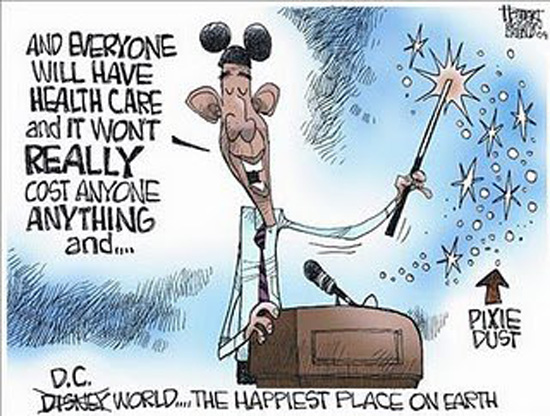 Intent, unlike pixie dust, does not magically make things happen.
Intent, unlike pixie dust, does not magically make things happen.
A few days before Christmas, The Chicago Tribune carried an infuriatingly conciliatory piece summarizing the Obama White House’s retreat from the policies of the Patient Protection and Affordable Care Act. Entitled “Reforming Obamacare, The Obama Administration Makes Concessions to Reality,” the article exhibits an abject lack of journalistic tact, choosing to close ranks behind the half-baked policies of a liberal White House instead of presenting a balanced analysis of the recent reform. Upon encountering the title, readers need no longer continue; it tells the whole story. Paying mere lip-service to two-years of consistent conservative opposition, The Tribune characterizes the revisions as the result of Big Government’s prescient recognition of Obamacare’s shortcomings. Exhibiting a sense of reality warped by liberal leanings, the authors imply that deafening cries of protest from Republican lawmakers and infuriated citizens were nonfactors; it was the maturity and far-sightedness of the Obama administration that “[made] concessions to reality.
Amazingly, this farcical bias is not the article’s primary shortcoming. That ignominious distinction belongs to the final paragraph. Having faithfully protected the ham-handed efforts of a ham-handed White House, the article closes with the all-too familiar refrain of conciliation:
The goal of the Obama health care plan is commendable: assuring medical insurance to millions who lack it and protecting it for those who have it. The changes the administration has made may be not enough to make it work optimally. But they’re a good start.
The shortsightedness of such analysis would be comical if it weren’t sincere. The Tribune would have you believe that we should judge all 2,471 pages of Obamacare’s bureaucratic largesse not upon what it actually accomplishes, but upon what it set out to do. Never mind the bill’s nightmarish and expensive execution. Never mind its extralegal individual mandate and the widespread public outrage it has generated. At the end of the day, it is the thought that counts.
Where in the world did such an absurd way of thinking come from? Just imagine if we were to subject other events in American history to The Tribune’s tortured logic. Using their aspirational analysis, one could easily conclude that the Dred Scott ruling of 1857 was a supremely commendable exercise in judicial review. Who cares that it enshrined slavery in western territories, codified extreme racial bigotry, and accelerated sectional fractiousness toward Civil War? In issuing the ruling and in authoring his majority opinion, Chief Justice Taney acted upon the praiseworthy intention of “solving the Union’s slavery problem” and curbing the rise of sectionalism. If the merits of his decision were judged on intent alone, then Taney should have a monument in Washington. Similarly, when you apply The Tribune’s philosophy, it is impossible to call prohibition a failure; despite the crime, corruption, and scandal the Eighteenth Amendment engendered, it was proposed with the most laudable of social goals in mind. Surely, that should be enough to cement it a favorable legacy. And let us not overlook the social engineering schemes of the Great Society. Examining only the aspirations of the Johnson administration, it is impossible not to celebrate the creation of Medicare and Medicaid and the modern welfare state. Using such logic, Johnson’s White House should be lionized for its admirable goal of expanding access to quality healthcare, $23.7 billion in annual fraudulent payouts and the horrific expansion of government be damned.
To judge decisions based upon their intent rather than outcome is foolish. More so than any pundit or politician, history is the best arbiter of policy, and it is a cruel one at that. The objective reality it presents plays foil to the lofty and naïve intents of policymakers, separating their praiseworthy aspirations from the disastrous results in a most dramatic fashion.
Today, we are witnessing the same phenomenon with President Obama and his healthcare plan. March 23rd will mark the two-year anniversary of the Patient Protection and Affordable Care Act’s passing. The House’s 219-212 vote was the culmination of four months of furious national debate, legislative machinations, and political horse-trading. What do the bill’s provisions have to show for all of that effort and ire? Not much. Obamacare’s shortcomings, evident in this recent round of reform, are far too manifold and popular contempt far too entrenched for anyone to support it on the merit of its accomplishments alone. Left with a poor track record, angry constituents, and a pending Supreme Court hearing, the bill’s supporters in the media and capital are grasping for the only thing that they have left: their commendable intentions. In a grand effort to save face, these individuals have erected political blinders to the reality of their legislative excreta, soothing themselves with reminders of their well-meaning designs.
It is time for these blinders to come off. Bad policy is bad policy, regardless of its objective. No solutions to the problems of healthcare reform will come from the left’s fixation with vindicating their bill’s origins. To dabble in the realm of intention when the record of history is so clear is counterproductive and serves only to suspend embarrassment where embarrassment is due. If Democrats are serious about fixing healthcare, the time has come to admit their mistake and renew the dialogue about how best to tackle the issues of the day. Only then will we see real results.
— Nick Desatnick

Be the first to comment on "Judging Intents"